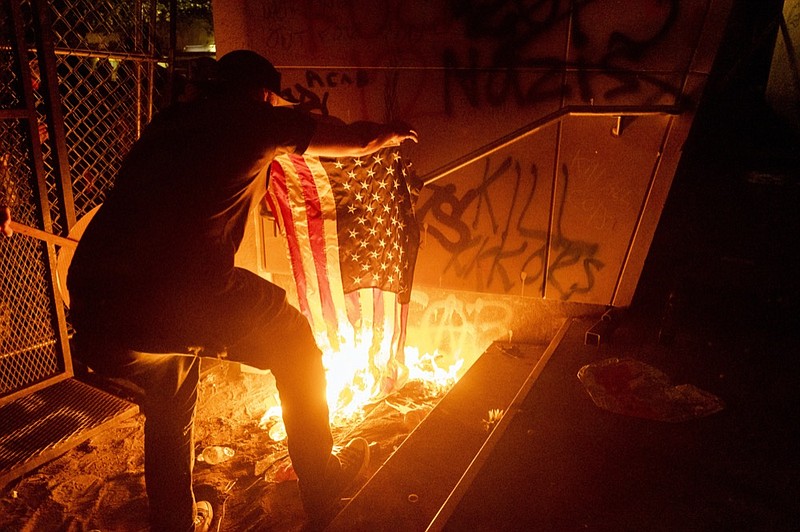You know your party is on the outs at the moment in Washington, D.C., if you're proposing a constitutional amendment to prohibit burning the American flag.
That what Tennessee senior Sen. Marsha Blackburn did Monday, joining four Republican colleagues in reintroducing a measure that forbids the physical desecration of the flag.
It's the kind of bill that is likely to gather much public support at the outset. After all, what kind of American who loves his or her country would entertain the thought of burning one of its most beloved and enduring symbols?
But such an amendment is wrong-headed.
We agree with the late, great Supreme Court Justice Antonin Scalia when he said in 2015, at one of his last public events, "If it were up to me, I would put in jail every sandal- wearing, scruffy-bearded weirdo who burns the American flag."
The justice wasn't finished.
"But," said Scalia, "I am not king."
You see, Scalia had provided the deciding vote in a 5-4 decision in 1989 that turned on First Amendment rights and upheld the right of protesters to burn the flag.
Gregory Lee Johnson had burned a flag at the Republican National Convention in Dallas in 1984. He was arrested and convicted on a Texas law that prohibited desecration of the flag. He was given a year in jail and ordered to pay a $2,000 fine.
His conviction was upheld by the Court of Appeals for the Fifth District of Texas but reversed by the Texas Court of Criminal Appeals, and that decision was then affirmed by the U.S. high court.
Not to be outdone, the then-Democratic Congress passed a national law prohibiting flag burning called the Flag Protection Act of 1989. But the Supreme Court struck down that law in another 5-4 decision in 1990.
"If there is a bedrock principle underlying the First Amendment," wrote Justice William Brennan, citing Johnson's original case, "it is that the Government may not prohibit the expression of an idea simply because society finds the idea itself offensive or disagreeable."
If you're like us, you might be able to come up with a list of things that you think shouldn't be said in public, that shouldn't be said about a president, that shouldn't be done to certain American symbols.
But, in nearly every case, the First Amendment free speech right is preeminent.
Take former Chicago Cubs outfielder Rick Monday, for instance. When a father and son attempted to burn an American flag in the outfield of Dodger Stadium during the middle of a Major League Baseball game in 1976, the center fielder swooped in, used his own First Amendment rights by grabbing the flag and raced it to safety.
"I think it solidified the thought process of hundreds of thousands of people that represented this country in fine fashion, many of whom have lost their lives," Monday said years later.
As John Mellencamp once sang, "Ain't that America!"
Justice Anthony Kennedy put it this way in the Johnson case: "The hard fact is that sometimes we must make decisions we do not like. We make them because they are right, right in the sense that the law and the Constitution, as we see them, compel the result. And so great is our commitment to the process that, except in the rare case, we do not pause to express distaste for the result, perhaps for fear of undermining a valued principle that dictates the decision. This is one of those rare cases."
In making her case for a constitutional amendment, Blackburn said, "Burning the flag is a direct affront to the values of our democratic republic. In Tennessee, we know all too well that the Stars and Stripes represent more than just patriotism; the flag is an unwavering beacon of valor, vigilance, and justice. This proposed constitutional amendment will ensure that these sacred ideals are preserved."
We go along with all of that - except the last sentence. A Constitutional amendment will not ensure the sacred idea of valor, vigilance and justice. Instead, the people of the country will do that by being informed about what their governments are doing, will do that by speaking out with those same First Amendment rights, and will do that with their votes for people they believe will represent them better.
Blackburn may be trying to buck up her fellow Tennesseans and many others in the country who have looked askance at what the Biden Administration has tried to do in its first five months in office. But a flag-burning constitutional amendment is not the right response.
To date, the country, in nearly 245 years, has had only 27 amendments to its Constitution. The flag has survived the Civil War, burnings by anti-war protesters in late 1960s and early 1970s, desecrations by left-wing anarchists in 2020 and a right-wing insurrection earlier this year. It endures because the country endures, and the country endures because its people endure through the sacred principles in that Constitution.
If we're truly free, as heinous as such an act is, we can nod knowingly if we hear of a random U.S. flag being burned because we know such an act cannot quench the foundational principles for which the flag stands.
